Thomas James Richards, Diaries, Transcript Vol. 2 - Part 30
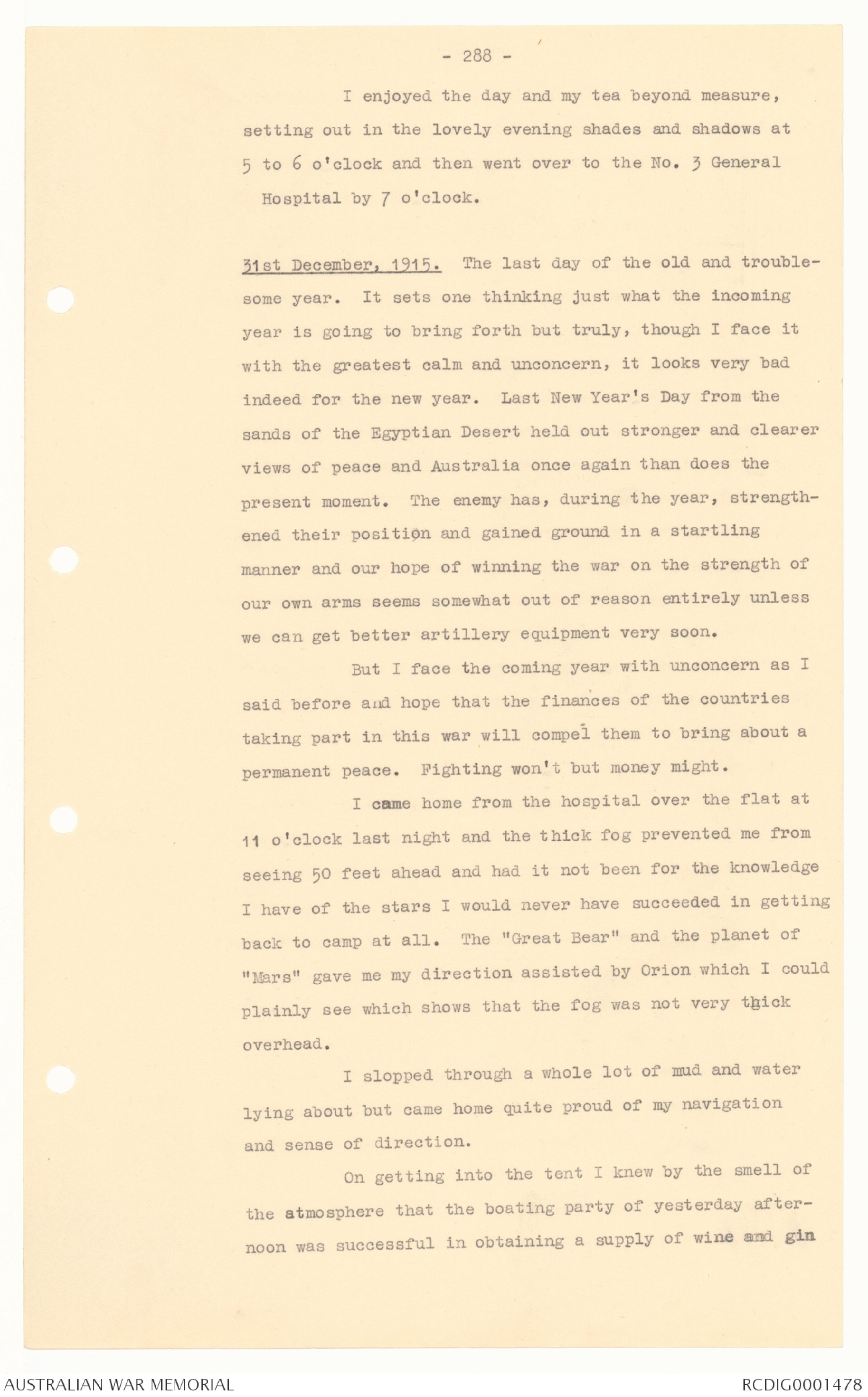
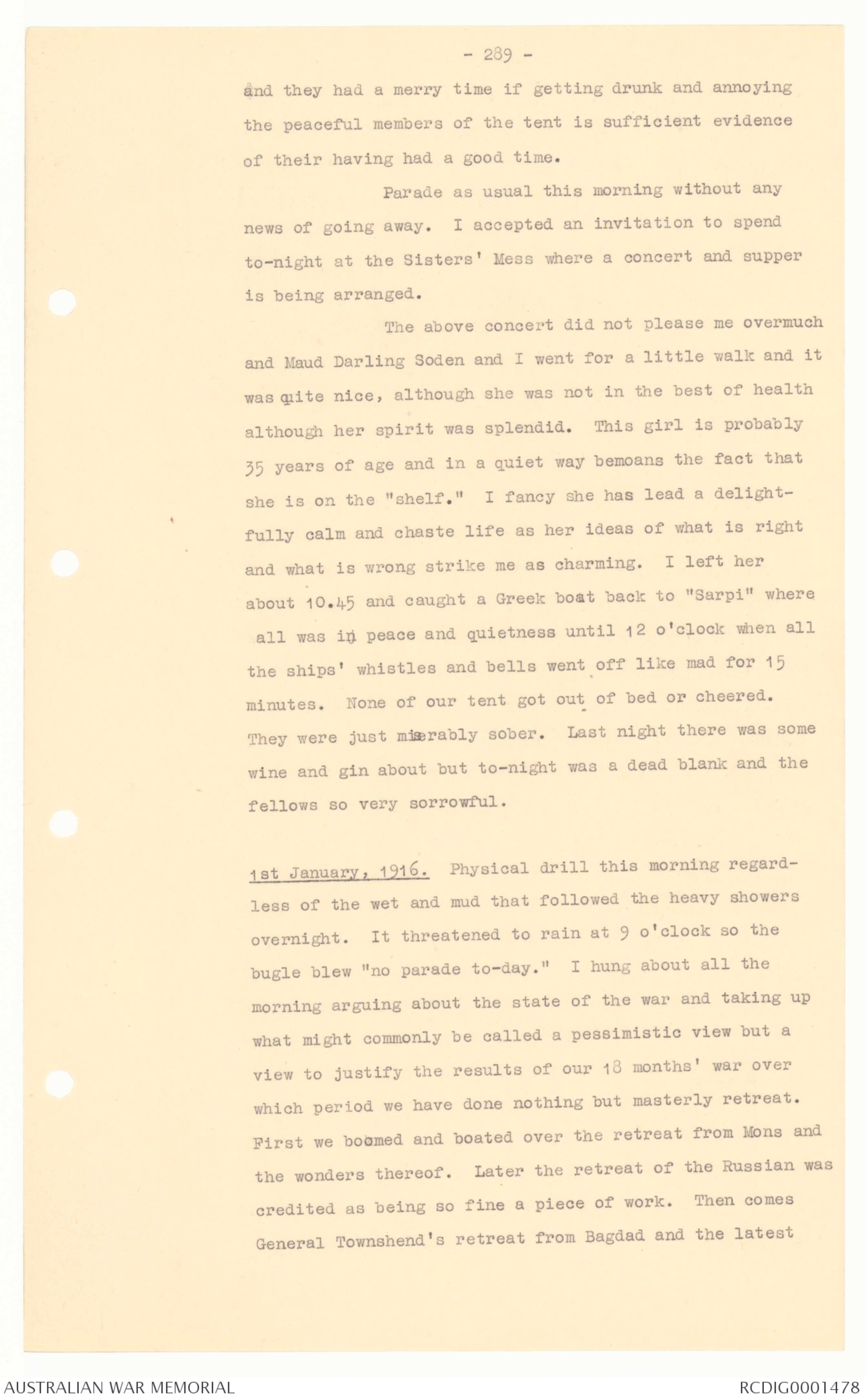
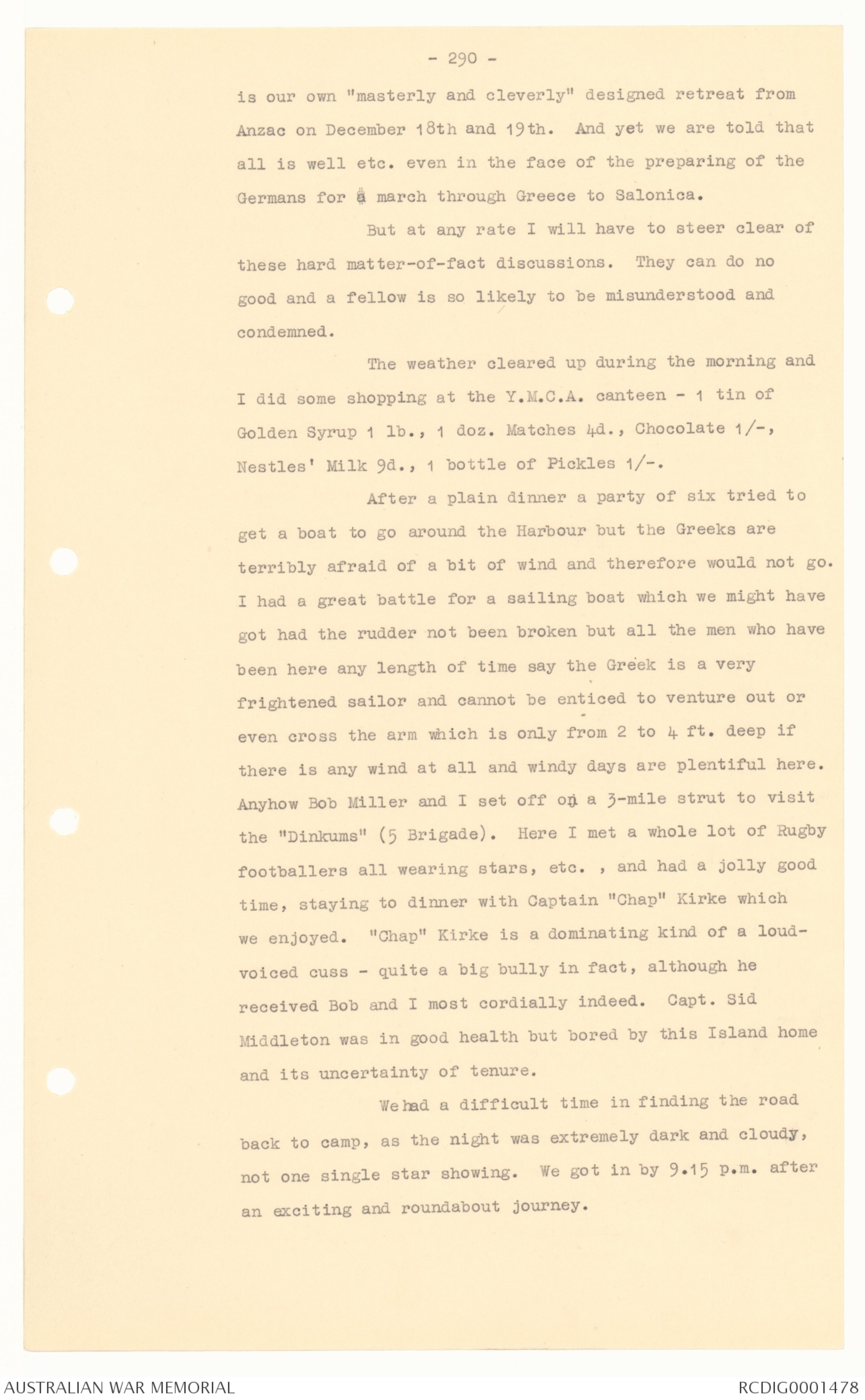
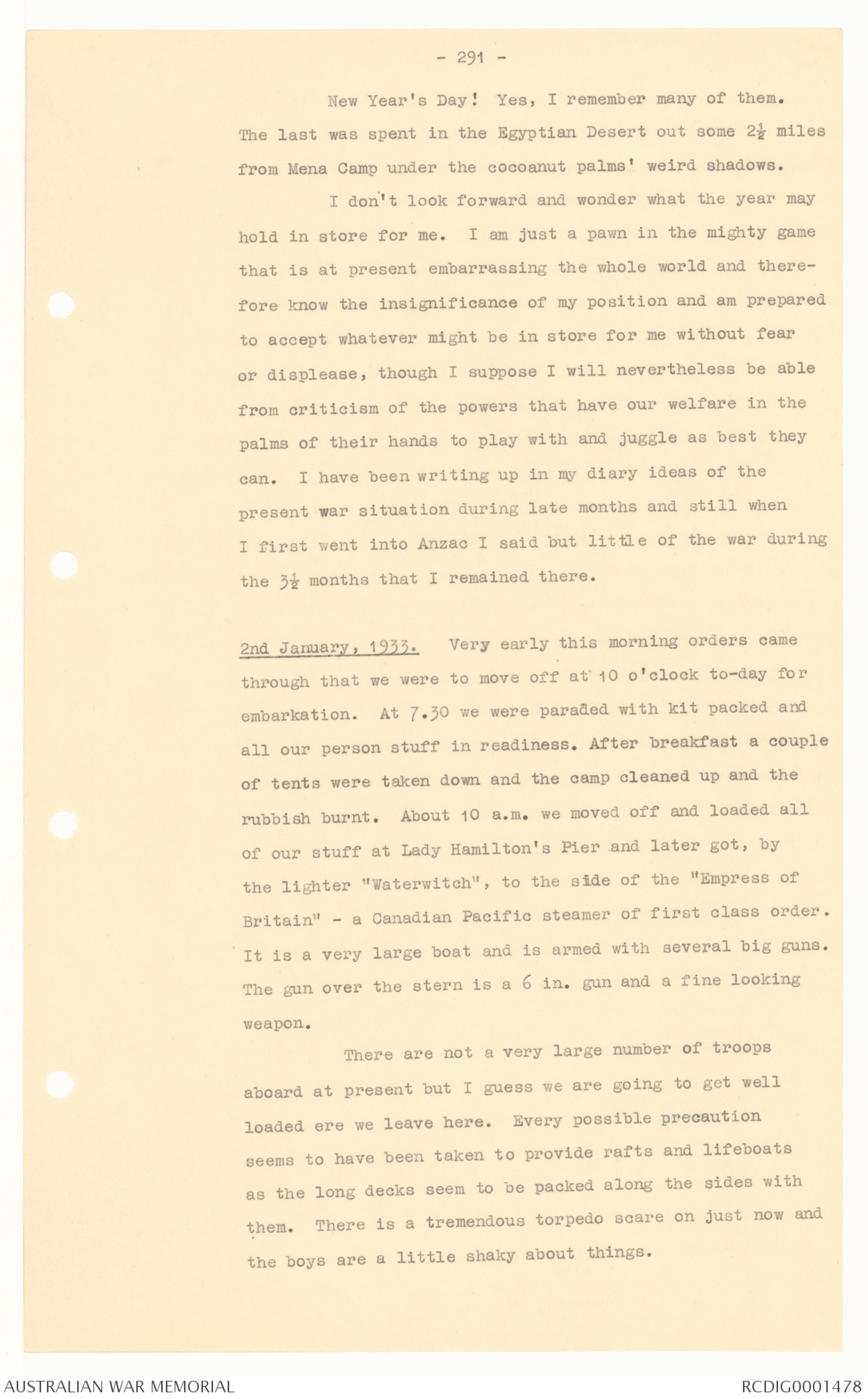
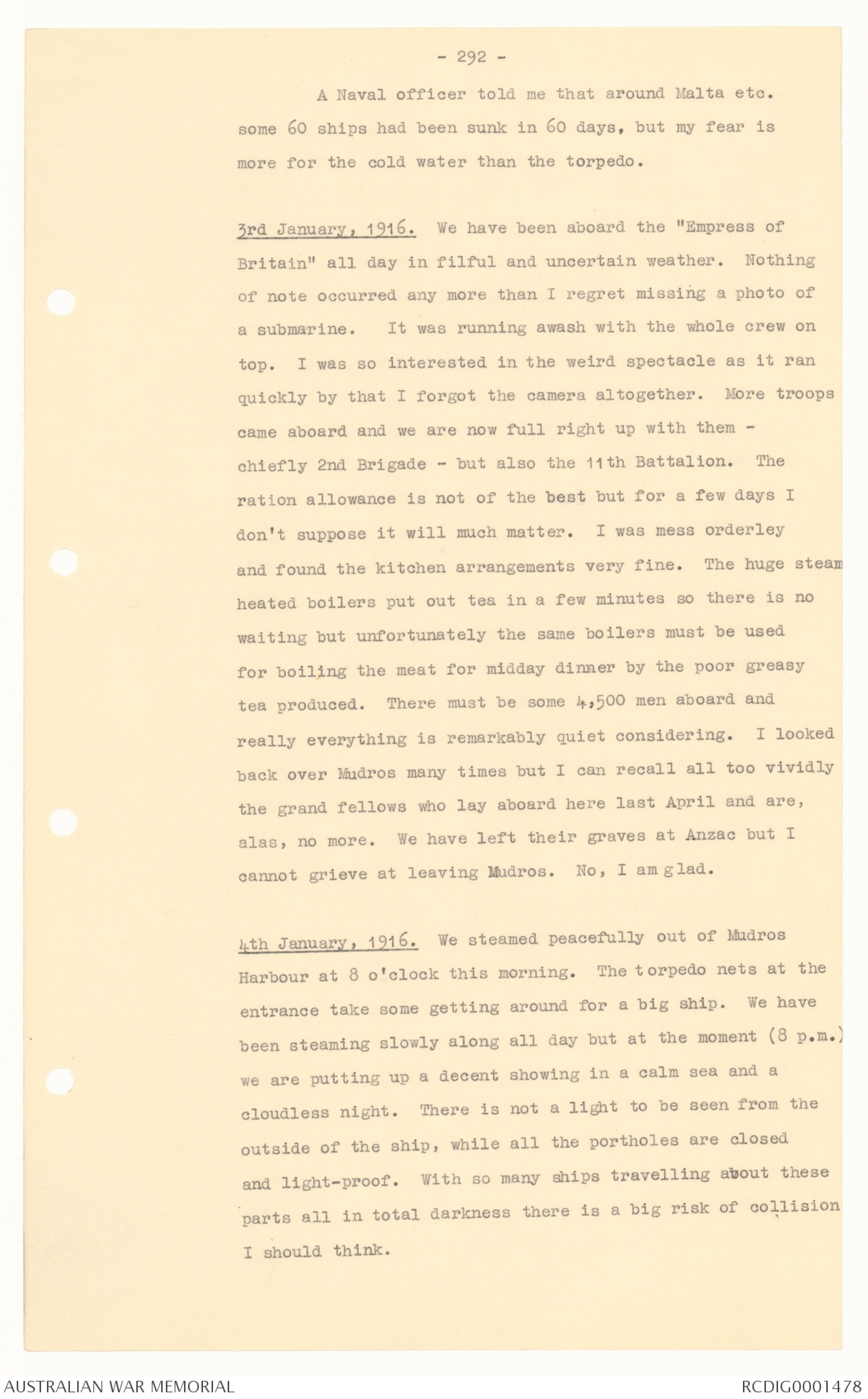
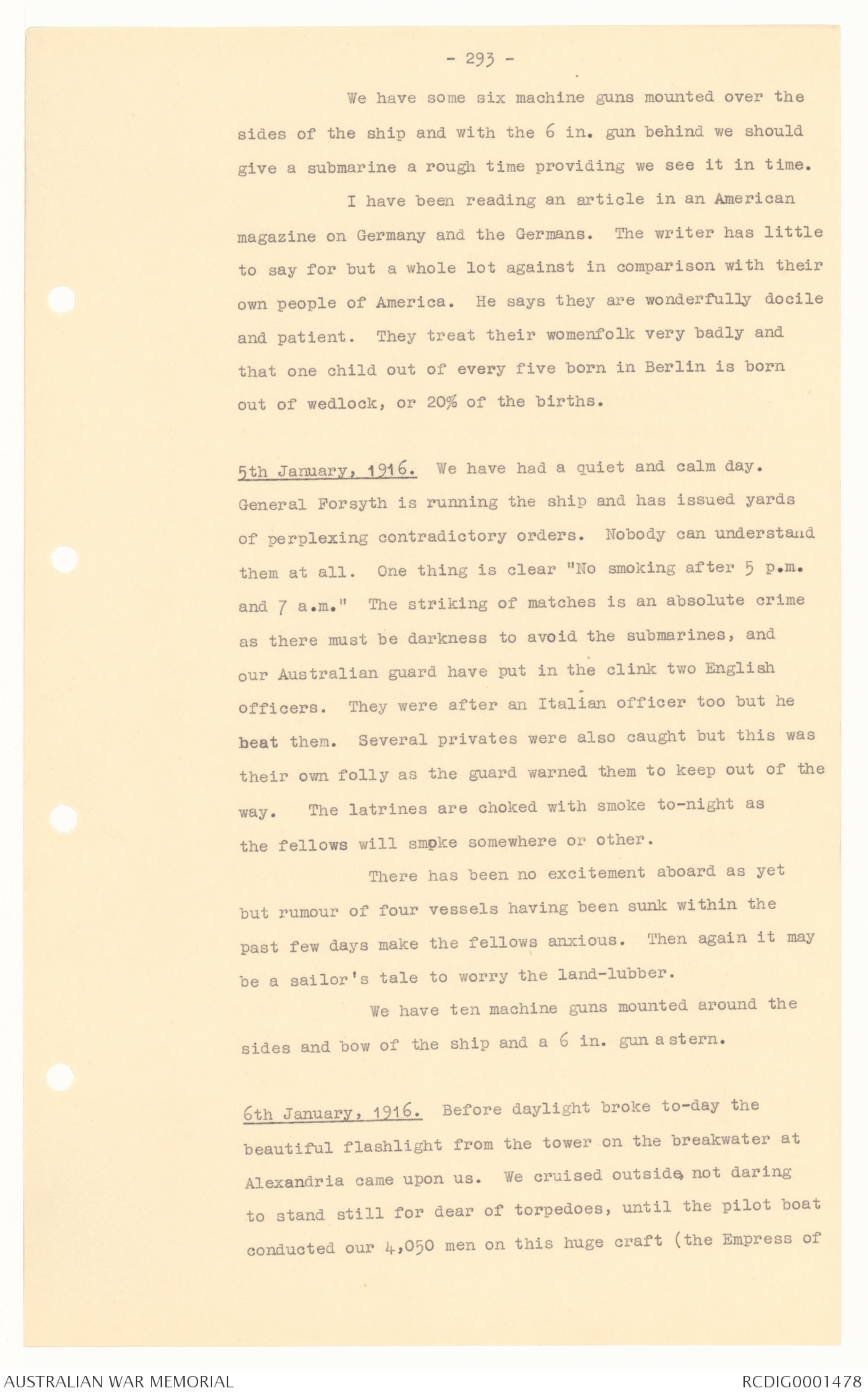
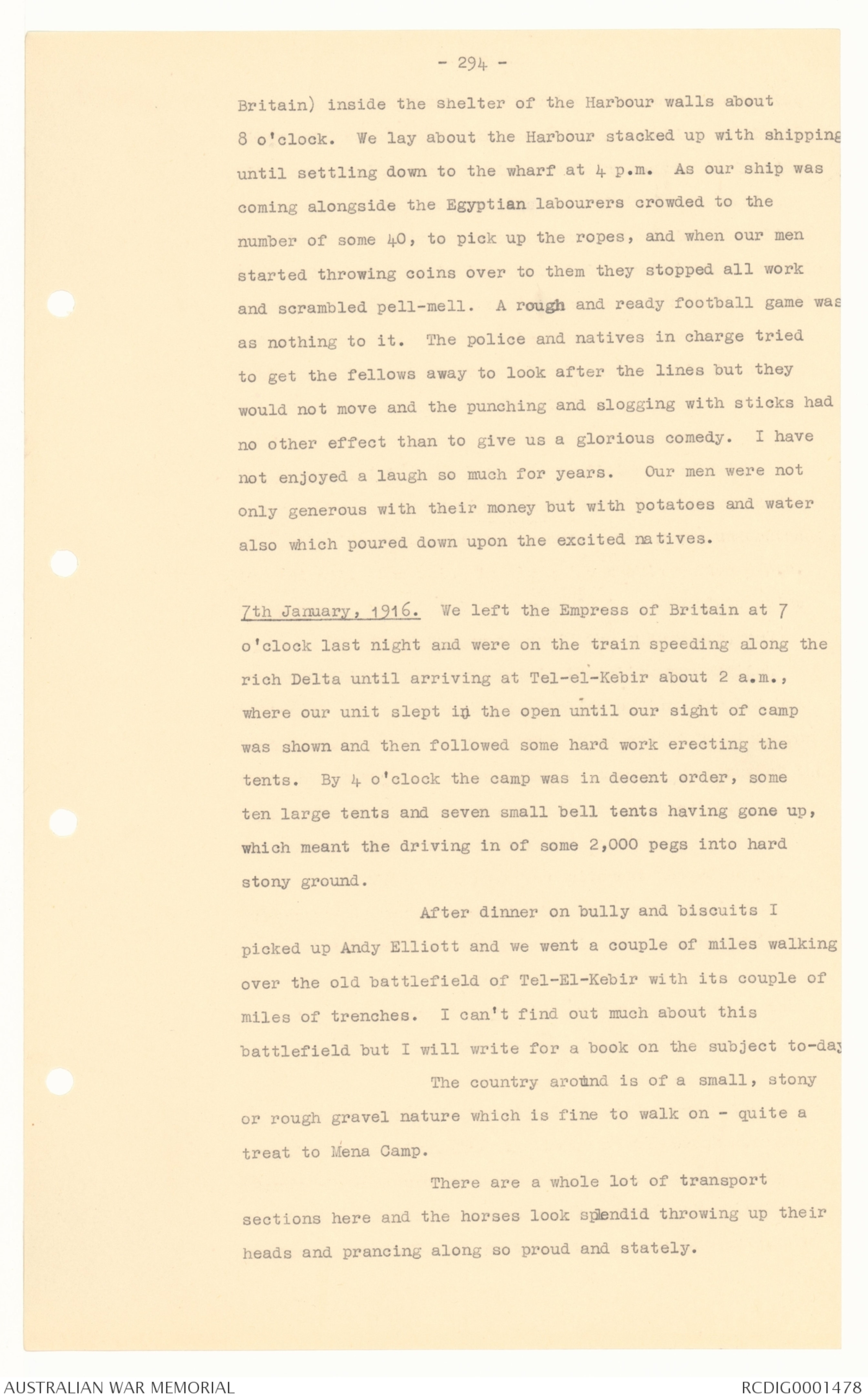
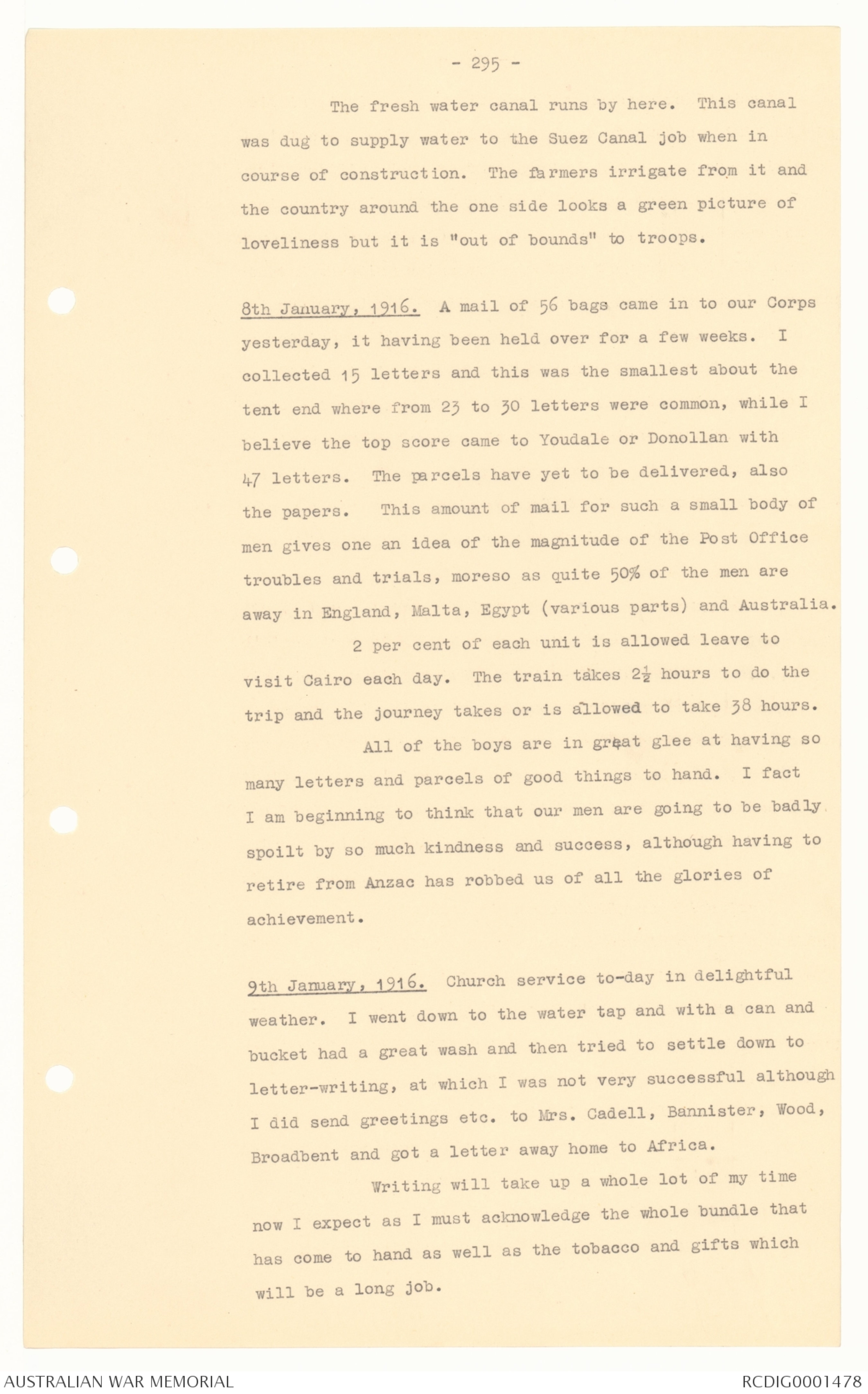
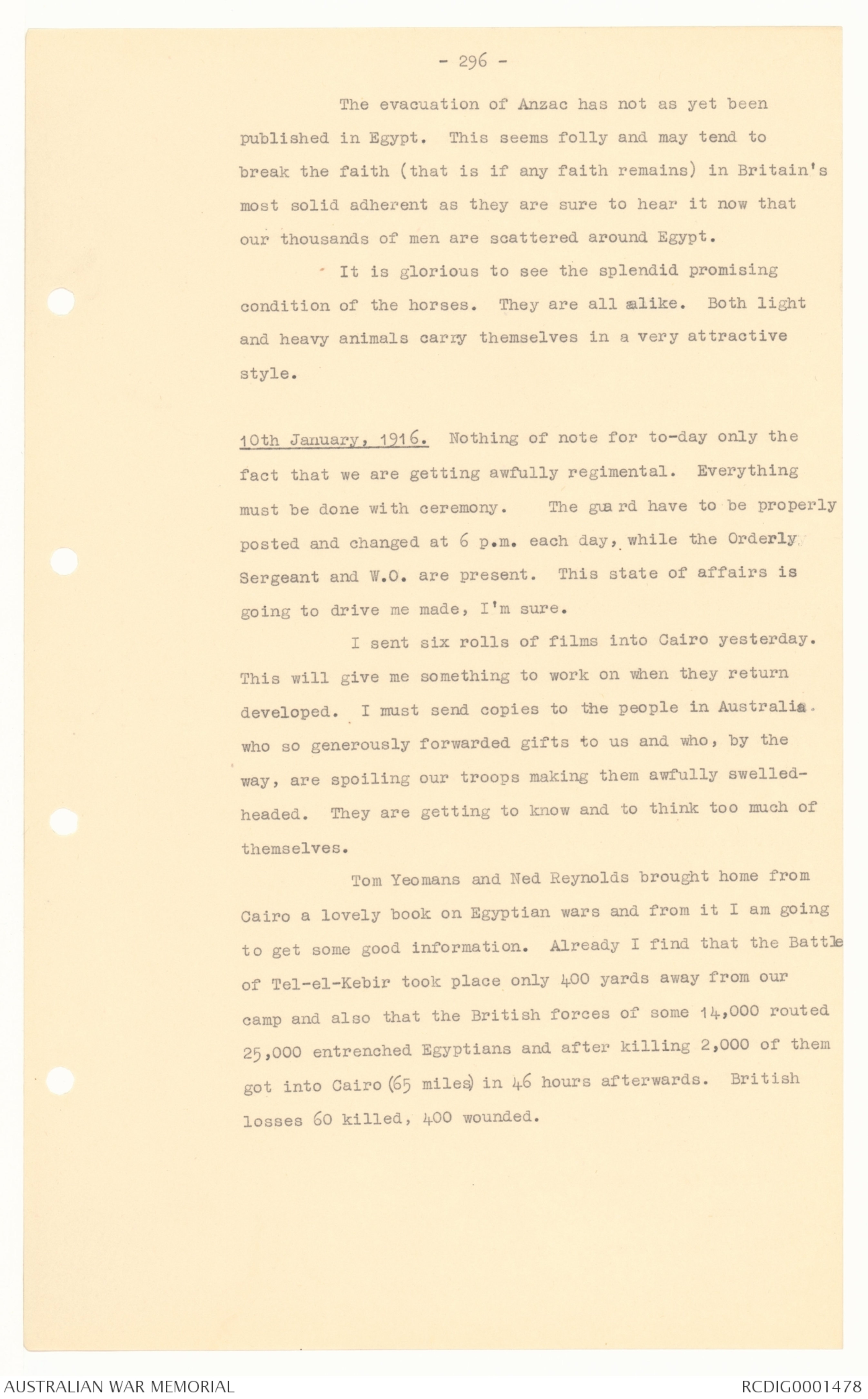
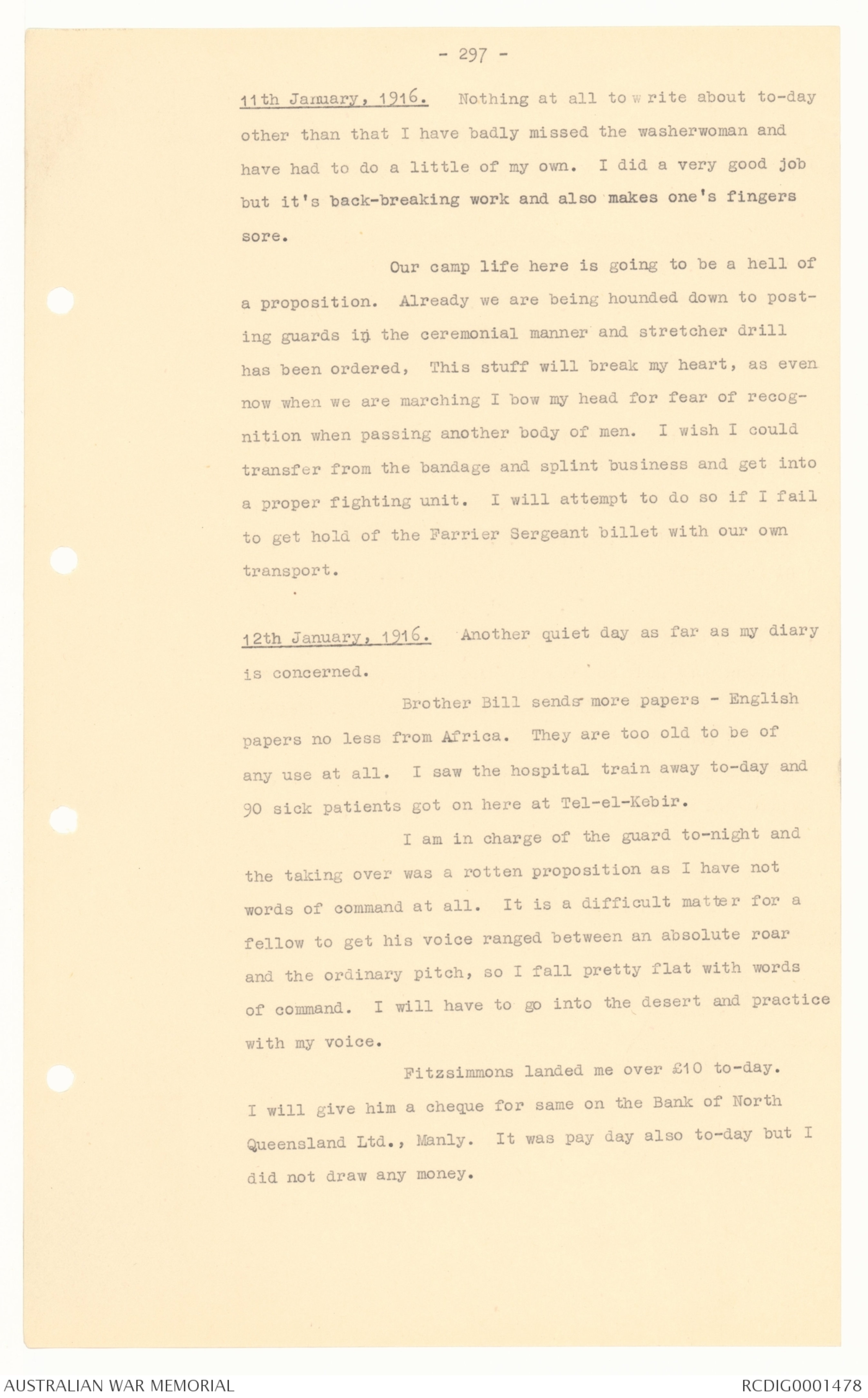
-288 -
I enjoyed the day and my tea beyond measure,
setting out in the lovely evening shades and shadows at
5 to 6 o'clock and then went over to the No. 3 General
Hospital by 7 o'clock.
31st December, 1915. The last day of the old and troublesome
year. It sets one thinking just what the incoming
year is going to bring forth but truly, though I face it
with the greatest calm and unconcern, it looks very bad
indeed for the new year. Last New Year's Day from the
sands of the Egyptian Desert held out stronger and clearer
views of peace and Australia once again than does the
present moment. The enemy has, during the year, strengthened
their position and gained ground in a startling
manner and our hope of winning the war on the strength of
our own arms seems somewhat out of reason entirely unless
we can get better artillery equipment very soon.
But I face the coming year with unconcern as I
said before and hope that the finances of the countries
taking part in this war will compel them to bring about a
permanent peace. Fighting won't but money might.
I came home from the hospital over the flat at
11 o'clock last night and the thick fog prevented me from
seeing 50 feet ahead and had it not been for the knowledge
I have of the stars I would never have succeeded in getting
back to camp at all. The "Great Bear" and the planet of
"Mars" gave me my direction assisted by Orion which I could
plainly see which shows that the fog was not very thick
overhead.
I slopped through a whole lot of mud and water
lying about but came home quite proud of my navigation
and sense of direction.
On getting into the tent I knew by the smell of
the atmosphere that the boating party of yesterday afternoon
was successful in obtaining a supply of wine and gin
- 289 -
and they had a merry time if getting drunk and annoying
the peaceful members of the tent is sufficient evidence
of their having had a good time.
Parade as usual this morning without any
news of going away. I accepted an invitation to spend
to-night at the Sisters' Mess where a concert and supper
is being arranged.
The above concert did not please me overmuch
and Maud Darling Soden and I went for a little walk and it
was quite nice, although she was not in the best of health
although her spirit was splendid. This girl is probably
35 years of age and in a quiet way bemoans the fact that
she is on the "shelf." I fancy she has lead a delightfully
calm and chaste life as her ideas of what is right
and what is wrong strike me as charming. I left her
about 10.45 and caught a Greek boat back to "Sarpi" where
all was in peace and quietness until 12 o'clock when all
the ships' whistles and bells went off like mad for 15
minutes. None of our tent got out of bed or cheered.
They were just miserably sober. Last night there was some
wine and gin about but to-night was a dead blank and the
fellows so very sorrowful.
1st January, 1916. Physical drill this morning regardless
of the wet and mud that followed the heavy showers
overnight. It threatened to rain at 9 o'clock so the
bugle blew "no parade to-day." I hung about all the
morning arguing about the state of the war and taking up
what might commonly be called a pessimistic view but a
view to justify the results of our 18 months' war over
which period we have done nothing but masterly retreat.
First we boomed and boated over the retreat from Mons and
the wonders thereof. Later the retreat of the Russian was
credited as being so fine a piece of work. Then comes
General Townshend's retreat from Bagdad and the latest
- 280 -
is our own "masterly and cleverly" designed retreat from
Anzac on December 18th and 19th. And yet we are told that
all is well etc. even in the face of the preparing of the
Germans for a march through Greece to Salonica.
But at any rate I will have to steer clear of
these hard matter-of-fact discussions. They can do no
good and a fellow is so likely to be misunderstood and
condemned.
The weather cleared up during the morning and
I did some shopping at the Y.M.C.A. canteen - 1 tin of
Golden Syrup 1 lb., 1 doz. Matches 4d., Chocolate 1/-,
Nestles' Milk 9d., 1 bottle of Pickles 1/-.
After a plain dinner a party of six tried to
get a boat to go around the Harbour but the Greeks are
terribly afraid of a bit of wind and therefore would not go.
I had a great battle for a sailing boat which we might have
got had the rudder not been broken but all the men who have
been here any length of time say the Greek is a very
frightened sailor and cannot be enticed to venture out or
even cross the arm which is only from 2 to 4 ft. deep if
there is any wind at all and windy days are plentiful here.
Anyhow Bob Miller and I set off on a 3-mile strut to visit
the "Dinkums" (5 Brigade). Here I met a whole lot of Rugby
footballers all wearing stars, etc., and had a jolly good
time, staying to dinner with Captain "Chap" Kirke which
we enjoyed. "Chap" Kirke is a dominating kind of a loud-
voiced cuss - quite a big bully in fact, although he
received Bob and I most cordially indeed. Capt. Sid
Middleton was in good health but bored by this Island home
and its uncertainty of tenure.
We had a difficult time in finding the road
back to camp, as the night was extremely dark and cloudy,
not one single star showing. We got in by 9.15 p.m. after
an exciting and roundabout journey.
-291-
New Year's Day! Yes, I remember many of them.
The last was spent in the Egyptian Desert out some 2½ miles
from Mena Camp under the cocoanut palms' weird shadows.
I don't look forward and wonder what the year may
hold in store for me. I am just a pawn in the mighty game
that is at present embarrassing the whole world and therefore
know the insignificance of my position and am prepared
to accept whatever might be in store for me without fear
or displease, though I suppose I will nevertheless be able
from criticism of the powers that have our welfare in the
palms of their hands to play with and juggle as best they
can. I have been writing up in my diary ideas of the
present war situation during late months and still when
I first went into Anzac I said but little of the war during
the 3½ months that I remained there.
2nd January, 1933. Very early this morning orders came
through that we were to move off at 10 o'clock to-day for
embarkation. At 7.30 we were paraded with kit packed and
all our person stuff in readiness. After breakfast a couple
of tents were taken down and the camp cleaned up and the
rubbish burnt. About 10 a.m. we moved off and loaded all
of our stuff at Lady Hamilton's Pier and later got, by
the lighter "Waterwitch", to the side of the "Empress of
Britain" - a Canadian Pacific steamer of first class order.
It is a very large boat and is armed with several big guns.
The gun over the stern is a 6 in. gun and a fine looking
weapon.
There are not a very large number of troops
aboard at present but I guess we are going to get well
loaded ere we leave here. Every possible precaution
seems to have been taken to provide rafts and lifeboats
as the long decks seem to be packed along the sides with
them. There is a tremendous torpedo scare on just now and
the boys are a little shaky about things.
-292-
A Naval officer told me that around Malta etc.
some 60 ships had been sunk in 60 days, but my fear is
more for the cold water than the torpedo.
3rd January, 1916. We have been aboard the "Empress of
Britain" all day in filful and uncertain weather. Nothing
of note occurred any more than I regret missing a photo of
a submarine. It was running awash with the whole crew on
top. I was so interested in the weird spectacle as it ran
quickly by that I forgot the camera altogether. More troops
came aboard and we are now full right up with them -
chiefly 2nd Brigade - but also the 11th Battalion. The
ration allowance is not of the best but for a few days I
don't suppose it will much matter. I was mess orderley
and found the kitchen arrangements very fine. The huge steam
heated boilers put out tea in a few minutes so there is no
waiting but unfortunately the same boilers must be used
for boiling the meat for midday dinner by the poor greasy
tea produced. There must be some 4,500 men aboard and
really everything is remarkably quiet considering. I looked
back over Mudros many times but I can recall all too vividly
the grand fellows who lay aboard here last April and are,
alas, no more. We have left their graves at Anzac but I
cannot grieve at leaving Mudros. No, I am glad.
4th January, 1916. We steamed peacefully out of Mudros
Harbour at 8 o'clock this morning. The torpedo nets at the
entrance take some getting around for a big ship. We have
been steaming slowly along all day but at the moment (8 p.m.)
we are putting up a decent showing in a calm sea and a
cloudless night. There is not a light to be seen from the
outside of the ship, while all the portholes are closed
and light-proof. With so many ships travelling about these
parts all in total darkness there is a big risk of collision
I should think.
- 293 -
We have some six machine guns mounted over the
sides of the ship and with the 6 in. gun behind we should
give a submarine a rough time providing we see it in time.
I have been reading an article in an American
magazine on Germany and the Germans. The writer has little
to say for but a whole lot against in comparison with their
own people of America. He says they are wonderfully docile
and patient. They treat their womenfolk very badly and
that one child out of every five born in Berlin is born
out of wedlock, or 20% of the births.
5th January, 1916. We have had a quiet and calm day.
General Forsyth is running the ship and has issued yards
of perplexing contradictory orders. Nobody can understand
them at all. One thing is clear "No smoking after 5 p.m.
and 7 a.m." The striking of matches is an absolute crime
as there must be darkness to avoid the submarines, and
our Australian guard have put in the clink two English
officers. They were after an Italian officer too but he
beat them. Several privates were also caught but this was
their own folly as the guard warned them to keep out of the
way. The latrines are choked with smoke to-night as
the fellows will smoke somewhere or other.
There has been no excitement aboard as yet
but rumour of four vessels having been sunk within the
past few days make the fellows anxious. Then again it may
be a sailor's tale to worry the land-lubber.
We have ten machine guns mounted around the
sides and bow of the ship and a 6 in. gun astern.
6th January, 1916. Before daylight broke to-day the
beautiful flashlight from the tower on the breakwater at
Alexandria came upon us. We cruised outside not daring
to stand still for dear of torpedoes, until the pilot boat
conducted our 4,050 men on this huge craft (the Empress of
- 294 -
Britain) inside the shelter of the Harbour walls about
8 o'clock. We lay about the Harbour stacked up with shipping
until settling down to the wharf at 4 p.m. As our ship was
coming alongside the Egyptian labourers crowded to the
number of some 40, to pick up the ropes, and when our men
started throwing coins over to them they stopped all work
and scrambled pell-mell. A rough and ready football game was
as nothing to it. The police and natives in charge tried
to get the fellows away to look after the lines but they
would not move and the punching and slogging with sticks had
no other effect than to give us a glorious comedy. I have
not enjoyed a laugh so much for years. Our men were not
only generous with their money but with potatoes and water
also which poured down upon the excited natives.
7th January, 1916. We left the Empress of Britain at 7
o'clock last night and were on the train speeding along the
rich Delta until arriving at Tel-el-Kebir about 2 a.m.,
where our unit slept in the open until our sight of camp
was shown and then followed some hard work erecting the
tents. By 4 o'clock the camp was in decent order, some
ten large tents and seven small bell tents having gone up,
which meant the driving in of some 2,000 pegs into hard
stony ground.
After dinner on bully and biscuits I
picked up Andy Elliott and we went a couple of miles walking
over the old battlefield of Tel-El-Kebir with its couple of
miles of trenches. I can't find out much about this
battlefield but I will write for a book on the subject to-day
The country around is of a small, stony
or rough gravel nature which is fine to walk on - quite a
treat to Mena Camp.
There are a whole lot of transport
sections here and the horses look splendid throwing up their
heads and prancing along so proud and stately.
-295-
The fresh water canal runs by here. This canal
was dug to supply water to the Suez Canal job when in
course of construction. The farmers irrigate from it and
the country around the one side looks a green picture of
loveliness but it is "out of bounds" to troops.
8th January, 1916. A mail of 56 bags came in to our Corps
yesterday, it having been held over for a few weeks. I
collected 15 letters and this was the smallest about the
tent end where from 23 to 30 letters were common, while I
believe the top score came to Youdale or Donollan with
47 letters. The parcels have yet to be delivered, also
the papers. This amount of mail for such a small body of
men gives one an idea of the magnitude of the Post Office
troubles and trials, moreso as quite 50% of the men are
away in England, Malta, Egypt (various parts) and Australia.
2 per cent of each unit is allowed leave to
visit Cairo each day. The train takes 2½ hours to do the
trip and the journey takes or is allowed to take 38 hours.
All of the boys are in great glee at having so
many letters and parcels of good things to hand. I fact
I am beginning to think that our men are going to be badly
spoilt by so much kindness and success, although having to
retire from Anzac has robbed us of all the glories of
achievement.
9th January, 1916. Church service to-day in delightful
weather. I went down to the water tap and with a can and
bucket had a great wash and then tried to settle down to
letter-writing, at which I was not very successful although
I did send greetings etc. to Mrs. Cadell, Bannister, Wood,
Broadbent and got a letter away home to Africa.
Writing will take up a whole lot of my time
now I expect as I must acknowledge the whole bundle that
has come to hand as well as the tobacco and gifts which
will be a long job.
-296-
The evacuation of Anzac has not as yet been
published in Egypt. This seems folly and may tend to
break the faith (that is if any faith remains) in Britain's
most solid adherent as they are sure to hear it now that
our thousands of men are scattered around Egypt.
It is glorious to see the splendid promising
condition of the horses. They are all alike. Both light
and heavy animals carry themselves in a very attractive
style.
10th January, 1916. Nothing of note for to-day only the
fact that we are getting awfully regimental. Everything
must be done with ceremony. The guard have to be properly
posted and changed at 6 p.m. each day, while the Orderly,
Sergeant and W.O. are present. This state of affairs is
going to drive me made, I'm sure.
I sent six rolls of films into Cairo yesterday.
This will give me something to work on when they return
developed. I must send copies to the people in Australis.
who so generously forwarded gifts to us and who, by the
way, are spoiling our troops making them awfully swelled-
headed. They are getting to know and to think too much of
themselves.
Tom Yeomans and Ned Reynolds brought home from
Cairo a lovely book on Egyptian wars and from it I am going
to get some good information. Already I find that the Battle
of Tel-el-Kebir took place only 400 yards away from our
camp and also that the British forces of some 14,000 routed
25,000 entrenched Egyptians and after killing 2,000 of them
got into Cairo (65 miles) in 46 hours afterwards. British
losses 60 killed, 400 wounded.
- 297 -
11th January, 1916. Nothing at all to write about to-day
other than that I have badly missed the washerwoman and
have had to do a little of my own. I did a very good job
but it's back-breaking work and also makes one's fingers
sore.
Our camp life here is going to be a hell of
a proposition. Already we are being hounded down to posting
guards in the ceremonial manner and stretcher drill
has been ordered, This stuff will break my heart, as even
now when we are marching I bow my head for fear of recognition
when passing another body of men. I wish I could
transfer from the bandage and splint business and get into
a proper fighting unit. I will attempt to do so if I fail
to get hold of the Farrier Sergeant billet with our own
transport.
12th January, 1916. Another quiet day as far as my diary
is concerned.
Brother Bill sends more papers - English
papers no less from Africa. They are too old to be of
any use at all. I saw the hospital train away to-day and
90 sick patients got on here at Tel-el-Kebir.
I am in charge of the guard to-night and
the taking over was a rotten proposition as I have not
words of command at all. It is a difficult matter for a
fellow to get his voice ranged between an absolute roar
and the ordinary pitch, so I fall pretty flat with words
of command. I will have to go into the desert and practice
with my voice.
Fitzsimmons landed me over £10 to-day.
I will give him a cheque for same on the Bank of North
Queensland Ltd., Manly. It was pay day also to-day but I
did not draw any money.
 Sandy Mudie
Sandy MudieThis transcription item is now locked to you for editing. To release the lock either Save your changes or Cancel.
This lock will be automatically released after 60 minutes of inactivity.